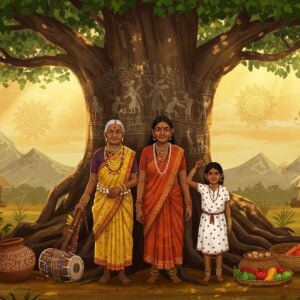
In Hindu philosophy, life unfolds through distinct stages known as Ashramas. The Grhastha Ashrama, the second stage, centers around family life, fulfilling duties, and raising children grounded in dharma. This phase is pivotal for nurturing spiritual and moral values in children, forming the foundation of a harmonious household.
Instilling Values in Children
Within the Grhastha Ashrama, Dharma illuminates the path of parenting. Teaching values like truth, non-violence (ahimsa), and compassion, drawing wisdom from Hindu scriptures such as the Bhagavad Gita and Ramayana, is paramount. These narratives instill moral principles in children’s hearts, offering guidance through captivating stories. Parents act as living examples of these virtues, embodying the values they wish to impart and serving as role models. Discipline is balanced with love and understanding, guiding children towards respectful behavior and good manners. This approach allows children the freedom to explore while staying grounded within a framework of essential values. Family traditions and customs hold significant power in shaping a child’s identity and fostering a deep appreciation for their heritage.
Spiritual Practices and Connection with the Divine
Introducing children to spiritual practices early in life cultivates a strong foundation for their moral and ethical development. Fostering a personal connection with the divine through prayer, meditation, and yoga can greatly benefit children’s inner peace and self-awareness. Simple breathing exercises and guided visualization can be particularly effective for younger children. Daily worship as a family strengthens bonds and promotes spiritual growth. This can include activities like arati, puja, singing devotional songs, reciting mantras, reading from scriptures, and meditating together. Emphasizing the importance of regular religious disciplines establishes a sense of routine and reverence in children’s lives.
Teaching and Storytelling
Parents serve as a child’s first gurus, guiding them through example, explanation, feedback, and loving advice. Storytelling, particularly from Hindu epics like the Ramayana and Mahabharata, imparts profound lessons in an engaging and relatable way. Vividly narrating stories of deities and characters from the Purana and Itihasa brings these teachings to life, captivating children’s imaginations while sharing timeless wisdom. Explore the wisdom of the Bhagavad Gita and its practical application in daily life through our insightful blog post.
Cultural Awareness and Heritage
Exposing children to Hindu traditions and cultural practices enhances their cultural awareness and appreciation for their heritage. Participating in festivals like Diwali and Holi instills a sense of belonging and strengthens their cultural identity. Regular visits to temples and other significant religious sites further familiarize children with Dharma and its practical expression in daily life. Discover the beauty of Hinduism through our blog post celebrating its rich diversity and enduring traditions.
Education in the Grhastha Stage
Education during the Grhastha stage encompasses both academic and spiritual learning. Choosing educational environments that align with family values is crucial for a child’s holistic development. Parents can complement formal education by imparting essential life skills, critical thinking abilities, and emotional intelligence. Learning languages, especially Sanskrit or regional languages, connects children to their cultural heritage and fosters a deeper understanding of their roots. Extracurricular activities like classical music and dance nurture creativity while reinforcing traditional values and discipline. Integrating technology into education can be beneficial when balanced with traditional learning methods, ensuring children receive a well-rounded educational experience. Mentorship from extended family and community members can further support a child’s educational journey.
Balancing Modern Life with Traditional Values
Balancing traditional values with the demands of modern life can present challenges, but it’s certainly achievable. Creating a family environment that respects both modern aspirations and traditional values is essential. Incorporating rituals and traditions into busy schedules in meaningful ways ensures they remain relevant and cherished. Digital media can play a positive role in preserving cultural values by providing access to online resources about Hindu philosophy, rituals, and practices. Open and honest communication within the family helps address potential conflicts between modernity and tradition, fostering understanding and mutual respect. Celebrating festivals and cultural events strengthens family bonds and reinforces traditional values, creating lasting memories and a sense of shared identity. Practicing mindful living in a modern context encourages conscious choices that reflect one’s values and priorities. Learn how to cultivate mindfulness and present moment awareness through our blog post on meditation.
Role of Family and Community
The extended family structure plays a vital role in raising children within the Hindu tradition. Grandparents and other relatives offer valuable guidance, sharing their wisdom and experiences through stories of tradition and faith. Involving children in community service instills the value of selflessness and compassion. Participation in such activities cultivates empathy and a sense of responsibility towards others. Teaching children to respect and revere elders is essential, as elders act as caregivers, mentors, and moral guides within the family and community. Discover the spiritual significance of cleanliness in Hindu rituals through our informative blog post.
Selfless Service (Seva)
Instilling the importance of Seva, selfless service, in children fosters compassion and empathy. Introducing the concept of karma yoga from the Bhagavad Gita emphasizes the significance of selfless action and its role in spiritual growth. By engaging in acts of service, children learn to consider the needs of others and contribute positively to society.
Poojn.in: Supporting Your Spiritual Journey
Poojn.in offers a wide selection of spiritual and cultural products to support families in their Grhastha Ashrama journey. From puja items to educational resources, we provide high-quality products that enhance your spiritual practices and connect you with your heritage. Browse our collection of Laddu Gopal idols or explore our range of incense sticks for your daily puja.
By embracing the principles of Dharma in the Grhastha Ashrama, parents nurture children who are spiritually grounded, culturally aware, and equipped with strong moral values, contributing to a more compassionate and harmonious world.


